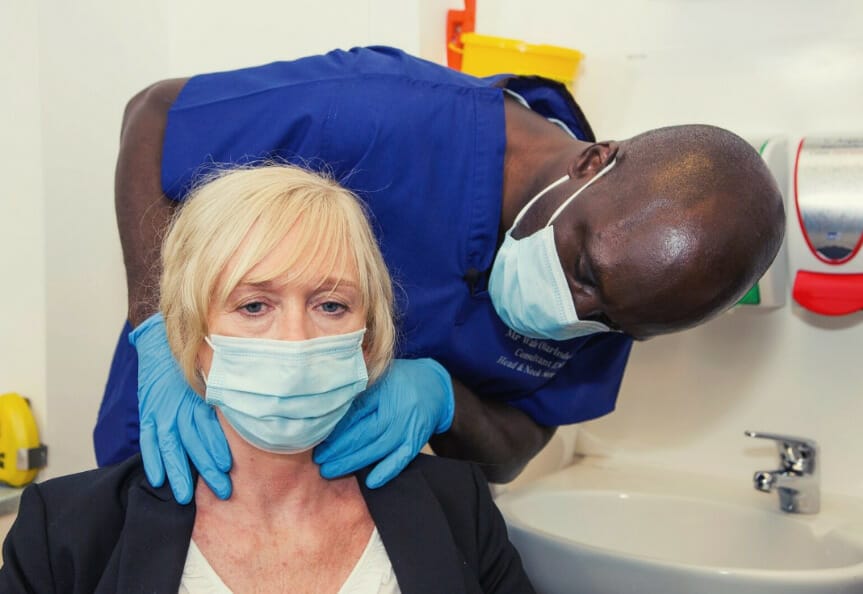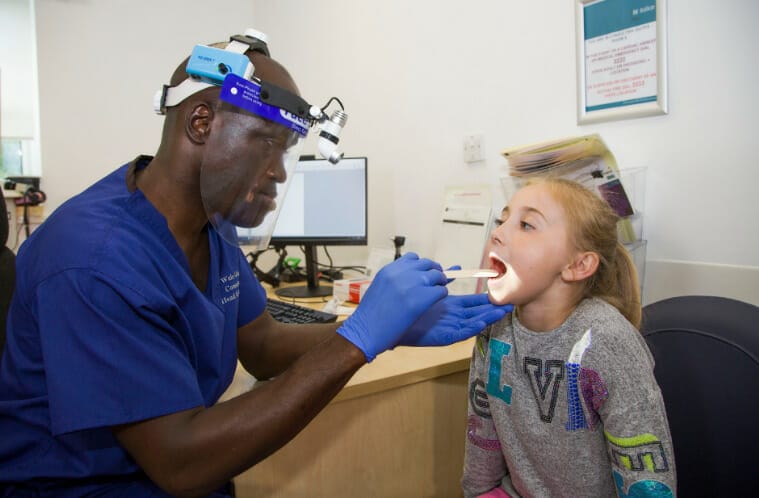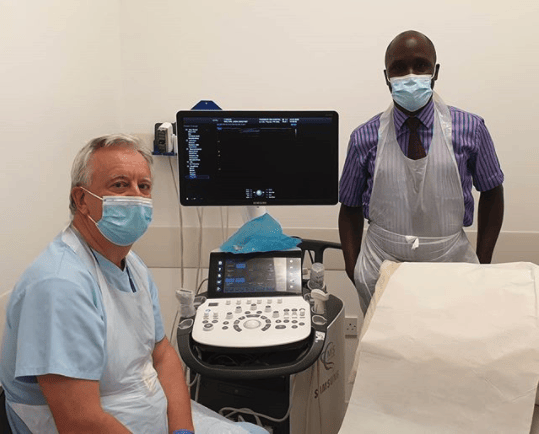Having a neck lump can be a confronting and uncomfortable situation, and if you don’t know much about them, you might be feeling anxious or concerned about what is happening. Most neck lumps are lymph node swellings which are usually a reaction to infection (and therefore usually harmless) but a history of the swelling put in context of the person’s medical history is needed to decide on the likely cause of a neck lump. Smoking and high alcohol consumption increase suspicion about cancer but an ultrasound scan and/or a needle biopsy may be required to arrive at a diagnosis.
Common Causes of Neck Lumps
Though neck lumps can seem to come up entirely out of the blue, there are many factors which can be at play. Neck lumps commonly come from the lymph nodes swelling up.
Lymph nodes act as filters for disease in the body and therefore swell up and become tender when there is an infection or disease in the part of the body that those lymph nodes are responsible for. This can include some less serious illnesses such as:
- Skin problems
- Dental infections
- Throat infections e.g. tonsillitis, quinsy, glandular fever
- Ear infections
- Lipomas
Whilst neck lumps can often be benign, it is important to know other more serious conditions which they can be a result of. These can be:
- Thyroid problems
- Head and Neck cancer
- Autoimmune disease
- Tuberculosis,
- HIV infection
- Sarcoidosis
In these cases seeking medical help is crucial, as treating them early on can make a marked difference in the outcomes of recovery.

When Should You Get Help for Neck Lumps?
It is hard to ignore neck lumps, and it is often a good idea not to, so although there is no need to jump to panic, visiting your GP or neck lump specialist is a great first step to knowing the cause and treatment for your neck lump.
However, if you are putting off seeing a specialist and are experiencing any of the following symptoms since noticing the meck lump, it is important to seek medical attention immediately:
- Difficulty swallowing
- Unexplained ear pain on one side
- Constant sore throat
- A non-healing mouth sore or ulcer
- Weight loss
- Persistent croaky or lost voice
- Difficulty breathing
- Blocked nose
After making an appointment with your GP or specialist, you will be asked to give some health history and information and have a physical exam. Your medical professional will then assess your neck lump by checking how hard or soft it is, how big it is and ensuring there aren’t more lumps going undetected. More tests might be necessary at this stage, but they will ultimately determine the underlying cause and your treatment options. An ultrasound scan (with or without a biopsy) is usually the most helpful investigation if an investigation is needed.

Treatment Options for Neck Lumps
Treatments vary depending on the underlying cause. Lumps are often not treated as a stand-alone condition as they are almost always a symptom of something else. Because of this, neck lump treatment comes down to what they are caused by; for example, a neck lump caused by an ear infection will subside as a result of the infection being treated. Lumps as a result of bacterial infections will be treated with antibiotics, and cancer-related lumps will be treated with radiotherapy, chemotherapy or surgery after an appropriate work-up. In some cases, lumps are surgically removed - benign thyroid lumps pressing on surrounding structures, congenital lumps e.g. branchial cysts or thyroglossal duct cysts, benign fatty lumps (lipomas) or parathyroid lumps causing high calcium levels in the blood.
Mr Olarinde runs a weekly multidisciplinary (with several other specialists) neck lump clinic in his NHS practice. This clinic is a screening clinic where patients with suspected cancer are quickly identified and investigated. Mr Olarinde’s specialist interest is in treating head and neck diseases (both cancerous and non-cancerous diseases). He has developed the expertise to appropriately investigate and treat different kinds of neck lumps. He replicates the practice of multidisciplinary working for patients with neck lumps in his private practice.

So if you’ve noticed a neck lump forming, you now know it is a symptom of various illnesses, from benign to severe, and best caught early on. if you have any concerns about your neck lump, give us a call today on 0114 321 6522 or drop us a message to discuss your concerns, and take the first step to get help and peace of mind!
There are several possible causes of a lump in the neck, including swollen lymph nodes due to infection, thyroid nodules or goitre, cysts, lipomas, and tumours. A medical evaluation is necessary to determine the exact cause.
Not all neck lumps are dangerous or cancerous. However, some lumps can be a sign of cancer, so it is important to get a medical evaluation to determine the cause.
Other symptoms that may accompany a neck lump include pain, fever, difficulty swallowing or breathing, hoarseness, weight loss, and changes in the skin over the lump.
The specific tests or examinations needed to determine the cause of a neck lump depend on the individual case. Your doctor may perform a physical examination, imaging tests (such as ultrasound, CT scan, or MRI), or a biopsy. Blood tests may occasionally be helpful.
A biopsy is often (but not always) needed to determine the cause of a neck lump. This involves taking a small sample of tissue from the lump for examination under a microscope.
The treatment options depend on the cause of the lump. If it is due to an infection, antibiotics may be prescribed. If it is due to a cyst or lipoma, surgical removal may be recommended. If it is cancerous, treatment may involve surgery, radiation therapy, and/or chemotherapy.
Surgery may be necessary to remove a neck lump, depending on the underlying cause. Your doctor will discuss treatment options with you based on the results of diagnostic tests.
Pain or discomfort associated with a neck lump can be managed with over-the-counter pain relievers, warm compresses, or ice packs. Your doctor may also prescribe pain medication.
Prevention measures depend on the underlying cause of the lump. Maintaining good hygiene and avoiding exposure to infection can help prevent some types of neck lumps. Regular check-ups with a healthcare provider can also help identify any potential issues early on.
Testimonials
Mr Olarinde carried out surgery to remove a lump from my son’s neck, and I trusted him completely with his care. When my son suffered complications following his initial surgery, Mr Olarinde came to visit us in Sheffield Children’s Hospital on his own time, which was a lovely personal touch. I wouldn’t hesitate to see Mr Olarinde again in the future.
NHS patient at Chesterfield Royal Hospital
Contact

